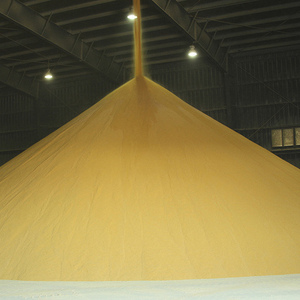USGC reports progress in expanding DDGS market in Philippines

March 26, 2013
BY Holly Jessen
Imports of U.S. distillers grains to the Philippines grew nearly 13 percent from 2011 to 2012 and there’s still potential for growth, according to the U.S. Grains Council.
Adel Yusupov, USGS regional director for Southeast Asia reported March 21 that imports to the Philippines in 2012 added up to 164,526 metric tons, an increase of 12.75 from the year before. USGS is continuing to work to promote the use of distillers grains in various areas of the country.
Most of the layer farms that are already using distillers grains are located in the South Luzon area of the Philippines. Some farms in this area have 15 percent inclusion levels already. In March, Adrian Morales, a USGC consultant, promoted the use of distillers grains and corn gluten meal in the North Luzon region of the Philippines, a relatively undeveloped market. During the trip he answered questions from feed millers, some of which had no experience with distillers grains, and met boiler and swine farmers in the area. “Visiting one-on-one with eight end users, including feed millers and large on-farm mix farmers, Morales highlighted advantages of using U.S. DDGS in the northern region,” Yusupov said. “While DDGS are currently priced out of the least cost ration formulation program, and are therefore replaced by cheaper feed stuffs such as corn and rice ban, there is still an opportunity to spread knowledge to attract future sales, when prices are favorable.”
Advertisement
Advertisement
Advertisement
Advertisement
Related Stories
The U.S. exported 31,160.5 metric tons of biodiesel and biodiesel blends of B30 and greater in May, according to data released by the USDA Foreign Agricultural Service on July 3. Biodiesel imports were 2,226.2 metric tons for the month.
CARB on June 27 announced amendments to the state’s LCFS regulations will take effect beginning on July 1. The amended regulations were approved by the agency in November 2024, but implementation was delayed due to regulatory clarity issues.
Legislation introduced in the California Senate on June 23 aims to cap the price of Low Carbon Fuel Standard credits as part of a larger effort to overhaul the state’s fuel regulations and mitigate rising gas prices.
The government of Brazil on June 25 announced it will increase the mandatory blend of ethanol in gasoline from 27% to 30% and the mandatory blend of biodiesel in diesel from 14% to 15%, effective Aug. 1.
The U.S. EIA reduced its 2025 and 2026 production forecasts for a category of biofuels that includes SAF in its latest Short-Term Energy Outlook, released June 10. The forecast for 2025 renewable diesel production was also revised down.
Upcoming Events









